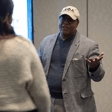
2. Beta | Greek University with Michael Ayalon
Michael Ayalon loves Greek life, but he also sees a wealth of issues that need to be tackled. In this episode, the CEO of Greek University and former executive director of Sigma Pi talks about what drew him to Greek life, the issues he addresses, what he is researching, working with campus administrators, and his tips for chapters to get the most out of Greek life.
About the Guest
As a professional public speaker, author, social media figure, host of the "Fraternity Foodie Podcast", and CEO of Greek University, Michael Ayalon is a recognized thought leader in the realms of fraternity and sorority life, business leadership, and higher education. He has headlined keynote presentations on over 200 college campuses in 40 states to help solve problems such as sexual assault, hazing, alcohol and drug abuse, and recruitment for college student organizations. Mike and his team published the From Letters to Leaders book series for Fraternity and Sorority leaders, and he co-authored the book Using AI to Grow Your Fraternity or Sorority. Mike is pursuing his doctorate at Middle Tennessee State University in assessment, learning, and student success (higher education concentration). His dissertation is titled "Early Warning Signs of Hazing in College Fraternities and Sororities". He earned his master's degree in public service management from Cumberland University, and he is a graduate of the School of Management at the University at Buffalo. In 2023, Mike was recognized for outstanding Interfraternity contributions and selected to the Order of Omega at the Association of Fraternity/Sorority Advisors Annual Meeting. In 2022, he received the Ronald H. Jury Interfraternal Friendship Award from Phi Mu Delta National Fraternity.
Ethocast is a "For Our Edification" limited series and is supported by Edify Ventures, LLC.



















